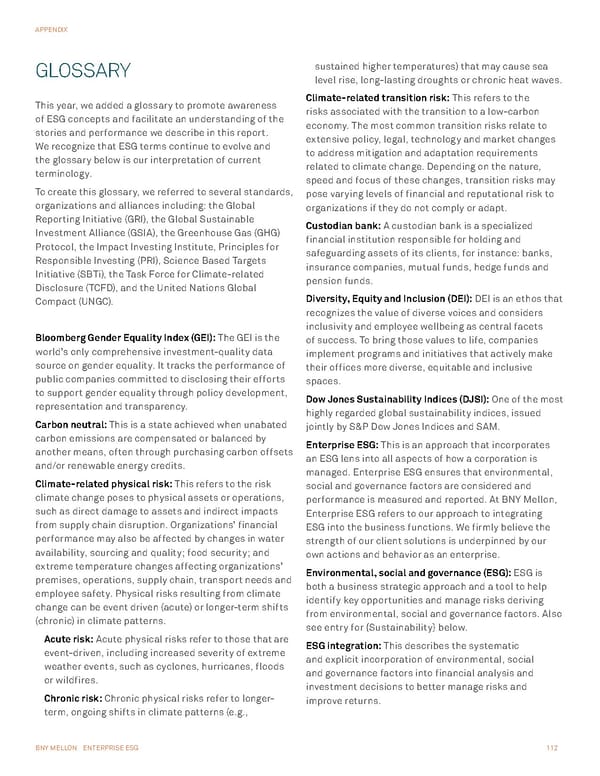BNY MELLON ENTERPRISE ESG 112 APPENDIX GLOSSARY This year, we added a glossary to promote awareness of ESG concepts and facilitate an understanding of the stories and performance we describe in this report. We recognize that ESG terms continue to evolve and the glossary below is our interpretation of current terminology. To create this glossary, we referred to several standards, organizations and alliances including: the Global Reporting Initiative (GRI), the Global Sustainable Investment Alliance (GSIA), the Greenhouse Gas (GHG) Protocol, the Impact Investing Institute, Principles for Responsible Investing (PRI), Science Based Targets Initiative (SBTi), the Task Force for Climate-related Disclosure (TCFD), and the United Nations Global Compact (UNGC). Bloomberg Gender Equality Index (GEI): The GEI is the world’s only comprehensive investment-quality data source on gender equality. It tracks the performance of public companies committed to disclosing their efforts to support gender equality through policy development, representation and transparency. Carbon neutral: This is a state achieved when unabated carbon emissions are compensated or balanced by another means, often through purchasing carbon offsets and/or renewable energy credits. Climate-related physical risk: This refers to the risk climate change poses to physical assets or operations, such as direct damage to assets and indirect impacts from supply chain disruption. Organizations’ financial performance may also be affected by changes in water availability, sourcing and quality; food security; and extreme temperature changes affecting organizations’ premises, operations, supply chain, transport needs and employee safety. Physical risks resulting from climate change can be event driven (acute) or longer-term shifts (chronic) in climate patterns. Acute risk: Acute physical risks refer to those that are event-driven, including increased severity of extreme weather events, such as cyclones, hurricanes, floods or wildfires. Chronic risk: Chronic physical risks refer to longer- term, ongoing shifts in climate patterns (e.g., sustained higher temperatures) that may cause sea level rise, long-lasting droughts or chronic heat waves. Climate-related transition risk: This refers to the risks associated with the transition to a low-carbon economy. The most common transition risks relate to extensive policy, legal, technology and market changes to address mitigation and adaptation requirements related to climate change. Depending on the nature, speed and focus of these changes, transition risks may pose varying levels of financial and reputational risk to organizations if they do not comply or adapt. Custodian bank: A custodian bank is a specialized financial institution responsible for holding and safeguarding assets of its clients, for instance: banks, insurance companies, mutual funds, hedge funds and pension funds. Diversity, Equity and Inclusion (DEI): DEI is an ethos that recognizes the value of diverse voices and considers inclusivity and employee wellbeing as central facets of success. To bring those values to life, companies implement programs and initiatives that actively make their offices more diverse, equitable and inclusive spaces. Dow Jones Sustainability Indices (DJSI): One of the most highly regarded global sustainability indices, issued jointly by S&P Dow Jones Indices and SAM. Enterprise ESG: This is an approach that incorporates an ESG lens into all aspects of how a corporation is managed. Enterprise ESG ensures that environmental, social and governance factors are considered and performance is measured and reported. At BNY Mellon, Enterprise ESG refers to our approach to integrating ESG into the business functions. We firmly believe the strength of our client solutions is underpinned by our own actions and behavior as an enterprise. Environmental, social and governance (ESG): ESG is both a business strategic approach and a tool to help identify key opportunities and manage risks deriving from environmental, social and governance factors. Also see entry for {Sustainability} below. ESG integration: This describes the systematic and explicit incorporation of environmental, social and governance factors into financial analysis and investment decisions to better manage risks and improve returns.
 BNY Mellon ESG Report Page 111 Page 113
BNY Mellon ESG Report Page 111 Page 113